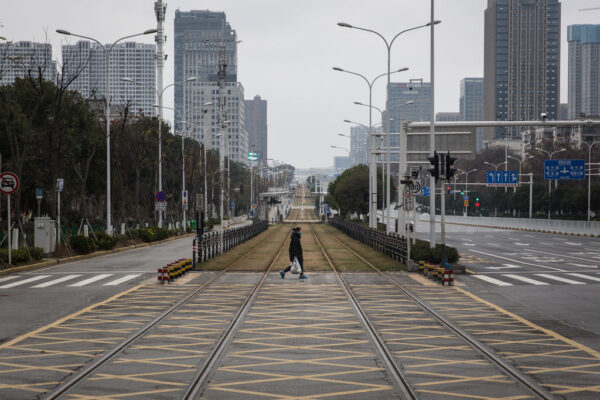
A woman crosses light rail tracks on an empty street in Wuhan. Since the outbreak of COVID-19, Chinese authorities have put the city – whose population is nearly equal to those of New York and Chicago combined – on lockdown.
One of the largest drugmakers in the world has become the latest to team up with the Department of Health and Human Services’ in efforts to create a vaccine against the novel coronavirus, while a biotech company reported that it has made progress in its own work.
HHS said Wednesday that it and Janssen Research & Development – part of New Brunswick, New Jersey-based Johnson & Johnson – had agreed to expand an existing relationship to develop the company’s vaccine against the novel coronavirus. Meanwhile, Cambridge, Massachusetts-based Moderna said that it had finished physical manufacturing of the first batch of the vaccine it is developing with the National Institutes of Health, mRNA-1273. Moderna said its vaccine is designed to be manufactured in 25 days and is undergoing analytical testing before release to the NIH for a planned Phase I clinical trial.
J&J and the Biomedical Advanced Research and Development Authority (BARDA), itself part of HHS’ Office of the Assistant Secretary for Preparedness and Response, will share costs and expertise to help bring the company’s vaccine into clinical development.
“With emerging infectious diseases such as COVID-19, speed is crucial to saving lives and reducing further spread of the virus,” BARDA Director Rick Bright said in a statement, using the new name for the virus, previously referred to as nCoV-2019. “Janssen is a proven partner with a flexible, rapid vaccine platform which gives us an edge in the race to protect people in the U.S. and worldwide from the health security threat posed by this novel coronavirus.”
The virus, a relative of the SARS and MERS coronaviruses, first emerged in the central Chinese city of Wuhan, with a population of around 11 million, in December. Since then, it has spread rapidly around the world, particularly within China. As of Wednesday, the number of confirmed cases was 45,171, with 44,730 of them in China, while 1,115 people have died, according to the World Health Organization.
The virus was a major topic of discussion at the BIO CEO & Investor conference in New York earlier this week.

Reducing Clinical and Staff Burnout with AI Automation
As technology advances, AI-powered tools will increasingly reduce the administrative burdens on healthcare providers.
“Everyone is talking about coronavirus in China,” Scynexis CEO Marco Taglietti said in an interview at the conference. “There are concerns we’re hearing even about the manufacturing side – is this going to impact the supply chain of the pharmaceutical industry? – and certainly coronavirus by itself.”
The supply chain concerns, Taglietti explained, stem from the fact that with cities like Wuhan on lockdown and under quarantine, many people are simply not going to work, which affects the manufacturing of the products and raw materials on which drugmakers depend. “It’s all connected,” he said.
Several other companies have also signed on to develop drugs and vaccines against COVID-19. Remdesivir, a drug that Gilead Sciences developed for Ebola virus, is being tested in clinical trials in China, while companies like Regeneron Pharmaceuticals are also working with BARDA. While there are no approved treatments or vaccines for SARS or MERS, experts have expressed a more optimistic view about COVID-19, given that new technologies and greater openness to them among regulators have made it easier to develop them rapidly than it was before.
Photo: Getty Images










